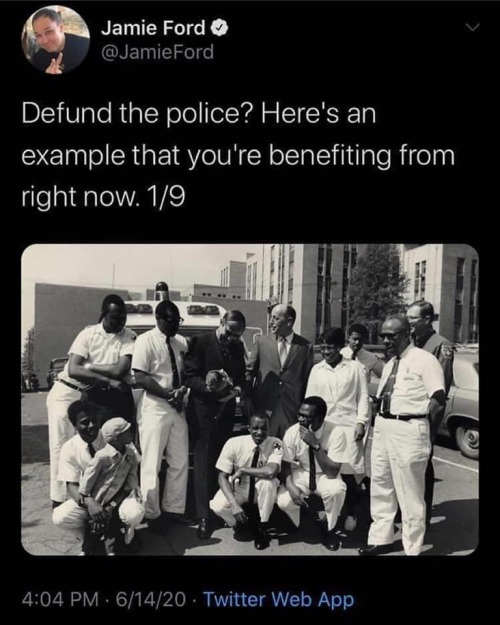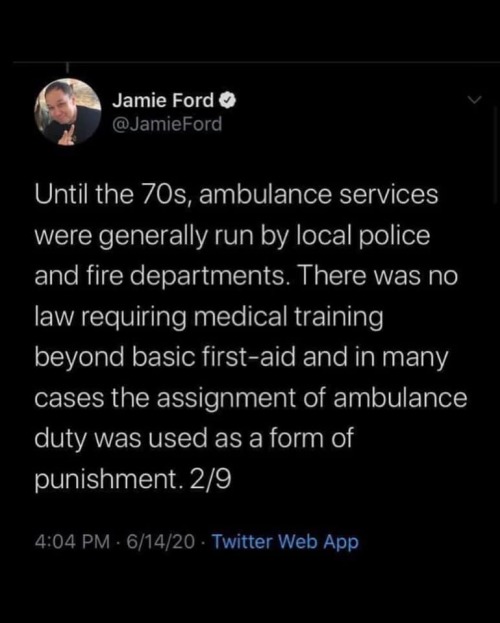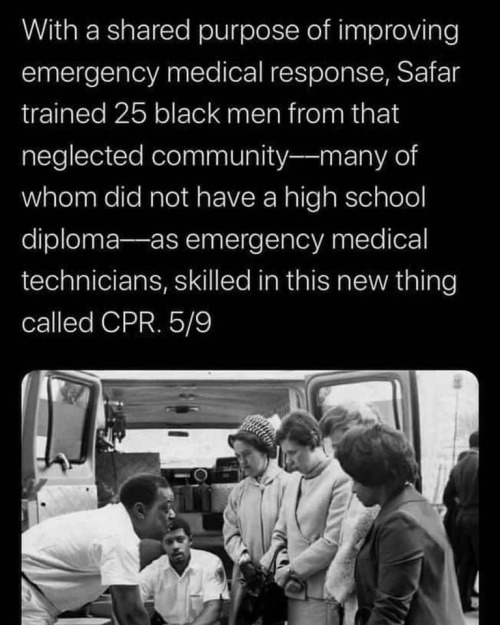Frankly I Don’t See The Point In Fussing Over The Precise Gender Identities Of Historical Figures And
Frankly I don’t see the point in fussing over the precise gender identities of historical figures and what they would hypothetically describe themselves as were they alive today. They’re not fictional characters—they’re dead people whose opinions on a continuously evolving topic are largely unknowable, but are part of a shared history nonetheless.
For example, whether a historical figure lived secretly as a man because she was a woman in a society where that was her only option to actually do the things she wanted to do, or because he was just more comfortable that way and wanted to be recognized as a man... how can we know? How can we determine that it was not both? How can we look back through history to a world so different from ours and come to conclusions about things that are often complicated and indistinct in our own time?
I just don’t see what is accomplished by trying to sort and separate trans history from GNC history based on factors we can’t truly be certain of. In an earlier generation, I think I may have lived and presented quite differently based on the choices available to me and the ease with which I may have pursued them. The world changes so much in so many ways and I can barely make sense of myself in my own time—it seems more practical to simply say, “Ah. Relatable. I can see much of myself in the record of your life.” and leave it at that. Our history is cultural, not ancestral, and in a hundred years we may be the source of just as much confusion and consternation even if we believe ourselves clear today.
More Posts from Bocmarkhord and Others
I thought it was fairly normal to feel empathy for bad people.
I thought it was common, even.
But after my Elon/Grimes post... now I'm wondering if I was mistaken about that.
I wrote a post about Trump being traumatized after his assassination attempt and a post about his poor adaptation to aging. I expressed sympathy for him in both cases. But I still maintain my white hot hatred of him and wish for him to face consequences.
Elon was abused by his father. Some of the stories are incredibly tragic. Hearing those stories triggers an involuntary response in my emotional systems that I can't stop no matter how much I despise present-day Elon. I also wonder if that abuse never occurred maybe we wouldn't be dealing with this current clusterfuck.
I have never held so much anger towards a single person as I do my brother. But I also see him as a victim of abuse. I know he was once a really good person and he was slowly corrupted. I feel sorry for him. I mourn the amazing person he used to be. And I still love him.
But that doesn't make me any less angry.
The wardrobe source post
Have had several Asks about where I get my clothes, so here we go.
My general style:

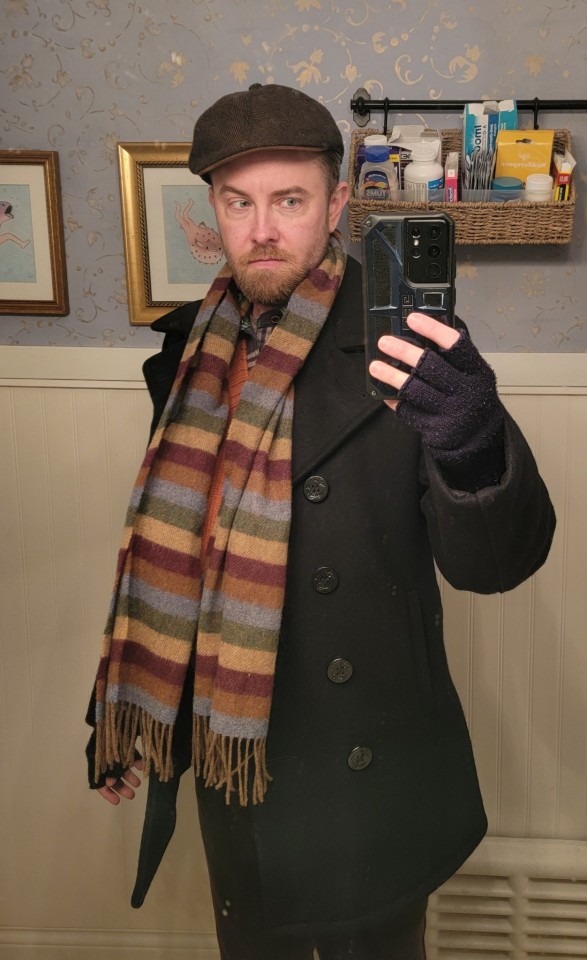





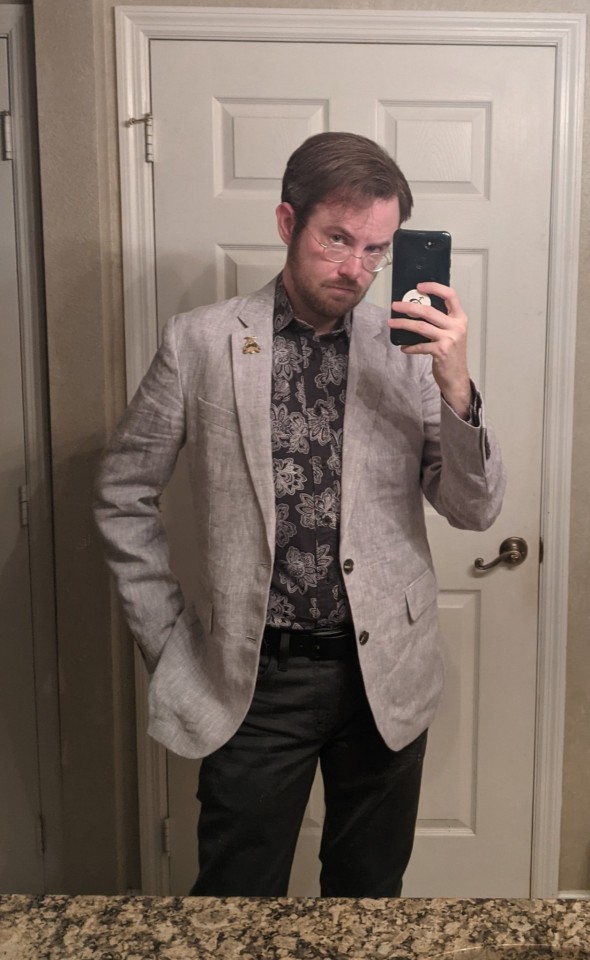

My build: I am 5'10", around 155-160lbs. I am a trans man, so that means some fit challenges. 36R tops, 32x32 bottoms, 8ish shoe.
My preferences: I adore 1930s/40s outdoor "country gentleman" and work wear -- I am building a wardrobe here. I love texture and mixing patterns. I try to stick to natural fibers. I am spending more money on pieces that last longer and shrinking my closet to a modern capsule and a vintage capsule. (Though I will sometimes mix eras.) Brown is my favorite color.
Online thrifting:
Unclaimed baggage. Really great for giving higher end brands a shot at huge discounts.
Gem App. Fantastic for searching multiple sites like ebay, poshmark, etc.
Modern clothing:
Taylor Stitch. Standouts are sweaters and wool trousers. Sizing runs trim - I size up to a 38 here instead of my usual 36. This means it's a great source for smaller trans mascs.
Yiume. Shirts a bit thin, but fun prints and frequent sales.
Imperfects. Small range, but fun, higher waisted fishtail trousers.
Taft Boots. Comfy right out of the box. Great at making small feet look elegant. Men's sizes start at a 6.
Schott. Fantastic pea coats. Recommended by Derek Menswear.
Vermont Flannel. Super thick plaid, flannel shirts. Very warm.
Sterkowski hats. Range includes flat caps and captains/fisherman.
Spier & MacKay. Great winter coats, run a bit trim. Their trousers look hideous and despite a bit of a vintage look, everything else in the catalog is too low waisted and skinny.
LLBean. Great for sweaters. I love my grey commando style one.
Banana Republic. I like a lot of their older stuff, so a brand to watch on Poshmark.
New Vintage:
Cathcart London. Sweaters and jeans are great. Hit or miss fit on the rest. Frequent sales, small runs.
Darcy Clothing. Great all across the board. They are a film supplier, so restocks are regular. Their suspenders are hard to find, fyi, so search under "braces".
Revival Vintage. Dipping into poly blends, but a great selection of fairisle sweater vests.
JoBear boots. Great prices and styles, requires breaking in.
Focusers. Vintage glasses. They will replace lenses. Love the Peabody gold wire frames.
Old Glasses Shop. Frames you won't find at Focusers. You can try on frames before committing to an Rx, but have to pay for the return. Love their round tortoise shells.
Friendly reminder that bisexual, pansexual, asexual, and aromantic people do not experience “straight passing privilege”.
Identity erasure is not a privilege, it is oppression.
A second note prompted by something else, but is a wider issue I see people missing a lot:
Oppression and suffering/harm are not actually the same thing. Which is not to say that oppression doesn’t cause harm - it pretty reliably does! - but rather that oppression is not the only thing that causes suffering, even suffering that we “should” care about.
(I mean I’m of the opinion that misery, harm and so on are pretty bad and we should look for ways to alleviate them in all people, but I’m talking here in a “you’re concerned about how society works? Ok look over here.”)
Oppression is a commentary on power-dynamics and organization - specifically, systemic abusive power-dynamics and organization. But many things are bad and cause significant human harm and suffering even without being a matter of systemic abusive power-dynamics.
For instance: due to how society works, chronic depressive disorder does in fact fit within the ambit of the systemic abusive power-dynamic called “ablism”.
However, even if it weren’t, it would still cause significant suffering and probably death, because that’s literally what the disease is.
(This, btw, is often a source of contention between disabled people whose problems would significantly be solved by society not being an ablist piece of shit, vs those whose conditions are inherently, fundamentally harmful. Chronic pain will still hurt a lot even if society has no abusive power-dynamics: the only way to stop chronic pain hurting is to, well, adequately treat and solve chronic pain. Conversely there is absolutely no need to “cure” hearing problems or neurodivergence in order to solve the primary problem of society’s shit power-dynamics. Because Intersectionality Is Hard, we fight about this a lot.)
This is important, because observing that a particular group suffers because of this, that or the other, is not actually the same as saying that the same group is oppressed in any given system.
So for instance, on the axis of “gender”, cis men are not “oppressed”: that is to say, the fucked-up power dynamics do not target and disenfranchise them.
That doesn’t mean it’s not harming them, or even killing them. It is. In fact toxic masculinity kills men continually. It just means that in terms of the power dynamic, they’re on the top of it.
Likewise, on the economic axis, the wealth-class are by definition not an oppressed group! AT ALL. EVEN REMOTELY. They are the top of the fucking heap. They have all the power and all the structural bullshit to the nth degree.
They are not oppressed.
However, they do still suffer and die from it. It still harms them. Because oppression is not the only form of harm.
This, for me, is perhaps part of the biggest reason understanding that systems don’t have to actually benefit anyone is important.
We have a tendency to look at groups and go “you’re not oppressed, ergo your reports of the suffering you’re experiencing are unimportant/made up.” Which doesn’t get very far, because humans as an entire species react badly to being told “you’re not actually suffering”.
But because we synonymise “suffering” and “being oppressed”, it also means that a person who knows (because they experience it) that they are suffering - that pain, harm and damage are occurring to them - will in turn either need to deny their own reality, or they will have to reinvent reality so that they are oppressed.
This?
This is what allows radical groups to recruit. Regardless of their focus and ideology. They can go: yes, we totally get that you’re suffering! And you know why you’re suffering? Because you don’t have enough power! And you know why you don’t have enough power? Because [whatever target group] actually has it! And any time they ask you do to something that’s difficult or uncomfortable or annoying, that’s them using their power over you, and oppressing you.
And bob’s your uncle.
Don’t get me wrong: oppression is absofuckinglutely a major cause of suffering. But it’s not the only cause, and it is not necessary for suffering, and suffering still matters even when it’s not caused by systemic power-imbalances. Hell, even when it’s causing same, because weirdly enough sometimes solving the suffering is a necessary part of solving the systemic power-imbalance.
(It is rarely sufficient: you usually have to do a shitload of stuff along with it. But it is often necessary, which is to say that if it’s not solved, all the other stuff won’t do it - at most it will just … flip who has the systematically imbalanced power.)
And because there are many ways in which power works in a society, it may be an abusive imbalance on one axis (like, say, economic class) that is causing significant suffering which is then misidentified as being caused by a different axis that the person is actually on the top of! And this is how you get the MADDENINGLY ILLOGICAL PERSISTENCE of violent white supremacy among the rural poor* so that they’re constantly working to maintain the power of landlords and members of the wealth-class who are directly exploiting them, because those landlords/etc are successful at convincing them that the actual problem here is that White People Are Oppressed.
Because humans are complicated and difficult.
And very very bad at thinking clearly when we’re miserable and suffering.
So that’s another thing that I think it is useful to understand, when trying to take the steps necessary to stop this world from being a miserable hellpit.
*(y: being inculcated with racism by society from birth helps a lot for sure. But have you ever been frustrated by the fact that white rural poor will, in fact, often ACT AGAINST THEIR OWN SELF INTEREST IN EVERY WAY? *points* Welp.)
Frankly I don’t see the point in fussing over the precise gender identities of historical figures and what they would hypothetically describe themselves as were they alive today. They’re not fictional characters—they’re dead people whose opinions on a continuously evolving topic are largely unknowable, but are part of a shared history nonetheless.
For example, whether a historical figure lived secretly as a man because she was a woman in a society where that was her only option to actually do the things she wanted to do, or because he was just more comfortable that way and wanted to be recognized as a man... how can we know? How can we determine that it was not both? How can we look back through history to a world so different from ours and come to conclusions about things that are often complicated and indistinct in our own time?
I just don’t see what is accomplished by trying to sort and separate trans history from GNC history based on factors we can’t truly be certain of. In an earlier generation, I think I may have lived and presented quite differently based on the choices available to me and the ease with which I may have pursued them. The world changes so much in so many ways and I can barely make sense of myself in my own time—it seems more practical to simply say, “Ah. Relatable. I can see much of myself in the record of your life.” and leave it at that. Our history is cultural, not ancestral, and in a hundred years we may be the source of just as much confusion and consternation even if we believe ourselves clear today.
The Other Half of the Social Model of Disability
Lots of people in fandom are aware of the Social Model of Disability, which is a direct contrast to the Medical Model of Disability. Problem is, most of those people only understand half of the Social Model.
If you don't know what I'm talking about, the "in a nutshell" version is that the medical model views disability as something that is broken and which needs to be fixed, and little or no consideration is given beyond trying to cure it (and little or no consideration is given to the needs and wishes of the person who has it). The social model of disability, on the other hand, says that the thing that disables a person is the way society treats them. So, for example, if someone is paralyzed and can't walk, what disables them from going places is buildings that are not wheelchair accessible. (Or possibly not being able to afford the right type of wheelchair.) Inaccessible spaces and support equipment you can't afford are choices society makes, not a problem with the disabled person.
People then take this to mean that the only problem with disability is the society that surrounds it, and therefore in some utopian future where capitalism is no more and neither is ableism or any other form of bigotry, all problems disabled people have will be solved.
Except that what I've just described is not actually what the social model of disability says. Or, rather, it's only half of what the social model of disability says.
The actual social model of disability begins with a distinction between impairments and disabilities. Impairments are parts of the body/brain that are nonstandard: for example, ears that do not hear (deafness), organs that don't work right (e.g. diabetes), limbs that don't work (paralysis), brain chemistry that causes distress (e.g. anxiety, depression), the list goes on. The impairment may or may not cause distress to the person who has it, depending on the type of impairment (how much pain it causes, etc.) and whether it's a lifelong thing they accept as part of themselves or something newly acquired that radically changes their life and prevents them from doing things they want to do.
And then you have the things that disable us, which are the social factors like "is there an accessible entrance," as described above.
If we ever do get a utopian world where everyone with a disability gets the support they need and all of society is designed to include people with disabilities, that doesn't mean the impairments go away. Life would be so much better for people with impairments, and it's worth working towards, but some impairments simply suck and would continue to suck no matter what.
Take my autism. A world where autism was accepted and supported would make my life so much easier ... and yet even then, my trouble sleeping and my tendency to hyperfixate on things that trigger my anxiety would still make my life worse. I don't want to be cured of my autism! That would change who I am on a fundamental level, and I like myself. My dream is not of a world where I am not autistic, but a world in which I am not penalized for being autistic and have the help I need. And even in that world, my autism will still sometimes cause me distress.
There are some impairments--conditions that come with chronic pain, chronic fatigue, etc.--where pretty much everyone with that impairment agrees that the ultimate goal is a cure. But nobody knows how long a cure will take to find (years? decades? centuries?), whereas focusing on the social things disabling you can lead to improvement in your daily life right now.
In conclusion: the social model of disability is very valuable, and much superior to the medical model on a number of levels. But: please don't forget that the social model makes a distinction between disability and impairments, and even if we reach every goal and get rid of all the social factors that disable people, some impairments will be fine and cause no distress to the people who have them, some will be a mixed bag, and some will still be major problems for the people who have them.
Also on Dreamwidth
Continuing on the topic of connection being not a feeling, but a rather a set of circumstances in which you are engaging and participating, I think a lot of people out there just don't realize how dangerous the way many of us have been taught to think of feelings in relation to spirituality really is.
Like Zan pointed out, Evangelical Christians are taught that positive emotions are actually the Lord moving through them, rather than their own personal reactions to their experiences. Meanwhile, Evangelical church services are deliberately engineered to elicit these kinds of of feelings in people. It's pure emotional manipulation.
Similar ideas are found in New Age spirituality, where "spiritual discernment" is frequently boiled down to "does it make me feel good or not?" People are taught to evaluate politically charged information based on whether it, for lack of a better term, sparks joy. Now, determining whether or not something sparks joy is a wonderful way to decide whether you want to keep your old tea kettle, but here we're talking about information that people will based crucial personal and political choices on.
Meanwhile, New Age influencers do everything they can to make sure they're sparking joy for you. Let's take Paul White Gold Eagle, for example. His videos are constantly talking about things that sound exciting, like messages from archangels, dragons of light, and emerald transmissions. This type of baiting - joybaiting, I'll call it - is meant to hook you emotionally and make you think that this has to be true because it elicits that oooough, shiny reaction. Next thing you know, you've been joybaited into falling down the conspirituality pipeline and you believe some version of QAnon's conspiracy theories.
This kind of thinking is even dangerous in pagan circles. You find yourself thinking about a thing and noticing a lot? You feel an intense pull to study it? You'll find people out there telling you that you have a spiritual connection to it, like, maybe you were part of it in a past life. And maybe you go and get a past life reading, or even undergo hypnosis. And now you, the whitest gal in the surburb with zero familial connections to any Native people, feel entitled to appropriate some form of Native spirituality because you felt fascination with it, or what you thought it was, and now you're contributing to white sage decimation and spreading around some sort of Native-flavored form of neopaganism as if it's actual Native spirituality.
Or maybe you fall in with a neopagan cult leader who uses your fascination to convince you that you knew each other in a past life, and you were led to them in this life so you could continue some important work in this life, and they pull you completely into their bullshit.
Finally, it's dangerous because it encourages stalkers. A lot of stalkers are people with incredibly powerful fixations on others. These types of beliefs get them convinced that their victims are actually their soulmates or twin flames or whathaveyou, and make them feel justified in engaging in stalking behavior.
All of this is why it's important to recognize that connection is a circumstance, not a feeling. Your feelings are utterly irrelevant to whether you are actually connected. What most people take for "feeling connected" is literally just fascination or fixation, maybe reinforced by the Baader-Meinhof phenomenon. Real connection is something you cultivate and build, and it does not exist outside of your actual, physical engagement and participation.
-
 bocmarkhord reblogged this · 4 months ago
bocmarkhord reblogged this · 4 months ago -
 violetta-mondarev reblogged this · 1 year ago
violetta-mondarev reblogged this · 1 year ago -
 bocmarkhord reblogged this · 1 year ago
bocmarkhord reblogged this · 1 year ago -
 fearless-stormclaw reblogged this · 1 year ago
fearless-stormclaw reblogged this · 1 year ago -
 herehaveafandom reblogged this · 2 years ago
herehaveafandom reblogged this · 2 years ago -
 easiepeas liked this · 2 years ago
easiepeas liked this · 2 years ago -
 darlinimamess reblogged this · 2 years ago
darlinimamess reblogged this · 2 years ago -
 darlinimamess liked this · 2 years ago
darlinimamess liked this · 2 years ago -
 lovewithoutresin reblogged this · 2 years ago
lovewithoutresin reblogged this · 2 years ago -
 lovewithoutresin liked this · 2 years ago
lovewithoutresin liked this · 2 years ago -
 no-sleep-for-the-dreamer liked this · 2 years ago
no-sleep-for-the-dreamer liked this · 2 years ago -
 litourgya liked this · 2 years ago
litourgya liked this · 2 years ago -
 padfootsbane reblogged this · 2 years ago
padfootsbane reblogged this · 2 years ago -
 padfootsbane liked this · 2 years ago
padfootsbane liked this · 2 years ago -
 pastpassages liked this · 2 years ago
pastpassages liked this · 2 years ago -
 judiops reblogged this · 2 years ago
judiops reblogged this · 2 years ago -
 shionuzukis reblogged this · 2 years ago
shionuzukis reblogged this · 2 years ago -
 fudgeneko liked this · 2 years ago
fudgeneko liked this · 2 years ago -
 volixia669 liked this · 2 years ago
volixia669 liked this · 2 years ago -
 dndbatkid reblogged this · 2 years ago
dndbatkid reblogged this · 2 years ago -
 andrzejdudamiedzymojeuda reblogged this · 2 years ago
andrzejdudamiedzymojeuda reblogged this · 2 years ago -
 lackadoodles liked this · 2 years ago
lackadoodles liked this · 2 years ago -
 sociallychallengednerd reblogged this · 2 years ago
sociallychallengednerd reblogged this · 2 years ago -
 eilupt reblogged this · 2 years ago
eilupt reblogged this · 2 years ago -
 antiqua-lugar reblogged this · 2 years ago
antiqua-lugar reblogged this · 2 years ago -
 iffy-epiphany liked this · 2 years ago
iffy-epiphany liked this · 2 years ago -
 antiqua-lugar liked this · 2 years ago
antiqua-lugar liked this · 2 years ago -
 m-moonshade liked this · 2 years ago
m-moonshade liked this · 2 years ago -
 philosopherking1887 reblogged this · 2 years ago
philosopherking1887 reblogged this · 2 years ago -
 enbylesbie reblogged this · 2 years ago
enbylesbie reblogged this · 2 years ago -
 enbylesbie liked this · 2 years ago
enbylesbie liked this · 2 years ago -
 clownfall reblogged this · 2 years ago
clownfall reblogged this · 2 years ago -
 clownfall liked this · 2 years ago
clownfall liked this · 2 years ago -
 laas-yahnir reblogged this · 2 years ago
laas-yahnir reblogged this · 2 years ago -
 also-laas-yahnir liked this · 2 years ago
also-laas-yahnir liked this · 2 years ago -
 kvothbloodless liked this · 2 years ago
kvothbloodless liked this · 2 years ago -
 geniugus liked this · 2 years ago
geniugus liked this · 2 years ago -
 thewellofastarael reblogged this · 2 years ago
thewellofastarael reblogged this · 2 years ago -
 ireshiginami liked this · 3 years ago
ireshiginami liked this · 3 years ago -
 clearestbluest liked this · 3 years ago
clearestbluest liked this · 3 years ago -
 mojoworlddotcom liked this · 3 years ago
mojoworlddotcom liked this · 3 years ago -
 themuggymuggingmug liked this · 3 years ago
themuggymuggingmug liked this · 3 years ago -
 unabashedanthropologist liked this · 3 years ago
unabashedanthropologist liked this · 3 years ago -
 nusta liked this · 3 years ago
nusta liked this · 3 years ago -
 icecreamkink liked this · 3 years ago
icecreamkink liked this · 3 years ago -
 milquetoastcrunch liked this · 3 years ago
milquetoastcrunch liked this · 3 years ago -
 tukutuki liked this · 3 years ago
tukutuki liked this · 3 years ago -
 sunshineraccoon liked this · 3 years ago
sunshineraccoon liked this · 3 years ago

95 posts
